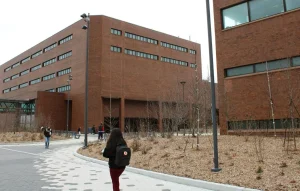Election season is upon us, and for many newly registered voters at UMass Boston, this is their first. On the Massachusetts ballot, there are five additional questions for voters to decide on topics important to the Massachusetts electorate.
Question 1, which was raised to the ballot by the current State Auditor Diana DiZoglio, decides whether or not the state auditor can audit the state Legislature. The auditor’s office “conducts audits, investigations, and studies to promote accountability and transparency, improve performance, and make government work better,” according to Mass.gov. A “yes” vote to this question will allow the state auditor to audit the state legislature without their consent, while a “no” vote will maintain the current process.
DiZoglio explained her motivations to GBH, saying, “We do have one of the least transparent state legislatures in the entire nation. And that’s been almost every good government group that’s ranked them in that way. And they’ve also been called one of the least effective.”
The latest poll from University of Massachusetts Amherst shows that 63% of voters agree with DiZoglio, while only 11% oppose the measure.
Several political scientists, including Professor Jerold Duquette of Central Connecticut State University, are among those who oppose the measure. Duquette told WBUR that legislative officials “will be compelled to produce documents, to produce records, which means she’ll have something that she can use in negotiations with the Legislature over anything.”
Another opposer is House Speaker Ron Mariano. He wrote in a letter to DiZoglio that the Counsel to the House of Representatives found Auditor DiZoglio’s request “unconstitutional,” according to a letter posted by WCVB.
Question 2 decides whether the Massachusetts Comprehensive Assessment System should remain a graduation requirement. The Massachusetts Teachers Association is pushing for a “yes” vote to this question. Their website states, “Question 2 maintains high educational standards and reduces the crushing stress placed on students by high-stakes testing — because a student’s ability to graduate shouldn’t depend solely on a one-size-fits-all standardized test.”
Proponents for the question say that MCAS disproportionately disadvantages both low-income students and students with disabilities. A “yes” on Question 2 doesn’t eliminate the MCAS entirely, but instead removes it as a graduation requirement.
Opponents of Question 2 say that removing MCAS as a graduation requirement will set different standards for graduation across Massachusetts’ 316 school districts. Most opponents consist of concerned parents who want their kids to receive a quality education, and a marker like the MCAS proves they are ready to graduate.
Gov. Maura Healey also opposes the question, telling WBUR, “Massachusetts has the best public schools in the country because of our high standards, not in spite of them.”
Unions for ride-share drivers is the topic for Question 3. Ride-share drivers, like those who drive for Uber or Lyft, are listed as independent contractors in Massachusetts, meaning they don’t qualify to form unions. This impacts their ability to communicate with their employers on topics like fair wages and labor conditions.
Question 3 provides a way to unionize legally for ride-share drivers. Supporters hope that this path will lead to fairer wages and compensation for gas and mileage. A University of Massachusetts Amherst/WCVB poll shows that 58% of voters agree with the proposed measure, and 27% oppose.
However, according to The Center for State and Policy Analysis at Tufts University, Question 3 might raise ride costs and in turn, “limit some of the known benefits of the apps, including reduced drunk driving and expanded mobility options.” There aren’t many opponents to the question, but some opposers question if the measure is necessary given the major breakthrough in benefits ride-share drivers received from the attorney general’s settlement in August.
Massachusetts could become only the third state to legalize psychedelic substances with Question 4. The ballot measure would allow five psychedelic substances — psilocybin, psilocin, dimethyltryptamine, mescaline and ibogaine — to be administered under licensed supervision to patients suffering mental health conditions like depression, anxiety or post-traumatic stress disorder.
The question would also create a Natural Psychedelic Substances Commission, appointed by the governor, attorney general and treasurer, which would administer laws surrounding how the substances are used and distributed. Later down the line, a yes vote would open the opportunity for adults over the age of 21 to grow and possess these substances in their home.
Many people suffering from PTSD support this bill, including U.S. Navy veteran Emily Oneschuk.
Oneschuk described her experience using psychedelic substances to treat her depression to WBZ, saying “I’ve seen it change my life and I’ve seen it change a lot of other people’s lives too.”
However, some are concerned about how the measure would open a pathway for legal home use and distribution.
“The home growth alone is dangerous for children, it’s dangerous for pets. This isn’t medicine, it’s not safe,” Chris Keohan of the Coalition for Safe Communities told WBZ.
In Massachusetts, tipped workers make $6.75 per hour compared to the $15 per hour wages that non-tipped workers make. Question 5 seeks to eliminate this difference, raising the minimum wage for tipped services to $15 per hour over five years. It also would allow managers to split tips with back-of-house staff.
Proponents of the proposed measure believe this will increase wages for tipped positions. However, many servers and bartenders don’t want the question to pass. The owner of 13 restaurants in Massachusetts, Ed Kane, polled his over-800 member staff and found that most did not approve.
“If over 90% of the people that you’re trying to protect don’t want this protection and don’t think this is good for them, then maybe it shouldn’t even have been a question,” Kane told WGBH.
This article appeared in print on Page 1 of Vol. LVIII Issue VI, published Nov. 4, 2024.





